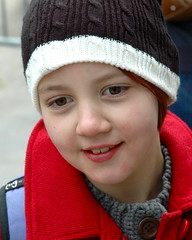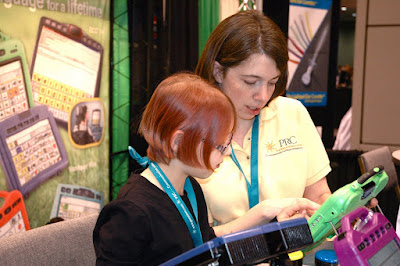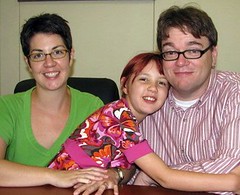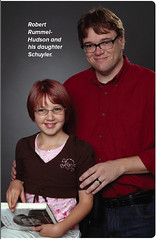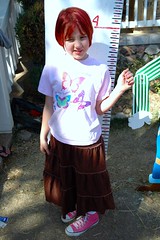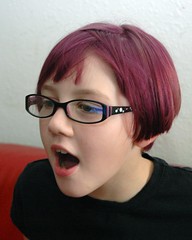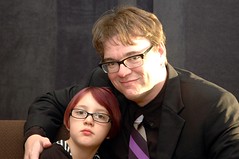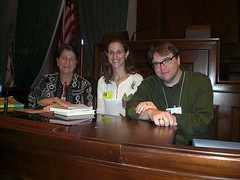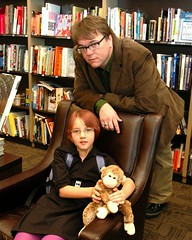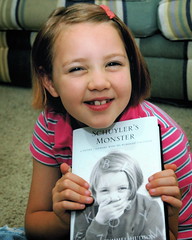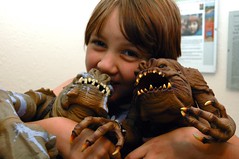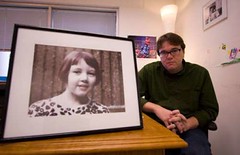We've been dealing with the issue of Schuyler having focus problems in school ever since the semester began. It's been something we've seen at home as well, where she will phase out and simply not seem to hear us when we say her name. It can be annoying, like the "selective hearing" that most little kids seem to get at some point in their lives, but after a few rocky weeks in school, she figured out her rhythm and started to perform. Her last grade report was all A's. The focus issues continued to come up, but they didn't seem to be seriously affecting her class work, so they became B-List worries.
It wasn't until one of her teachers actually described her moments of scattered focus that something became clear, something that should have been clear from the start, but wasn't. After Julie and I compared notes all day and after going back and doing more reading, and especially after seeing video that it never occurred to me would be available online, we saw it. We're beginning the process of confirming this medically, but today, we think we saw it.
Julie and I now believe that for at least the past six months, Schuyler has probably been experiencing absence seizures.
I'm trying not to beat myself up about this too much. Absence seizures are subtle, after all, and they manifest themselves in different ways, depending on the person. They are also particularly hard to detect in non-verbal subjects, for whom a sudden lapse in conversation is obviously not much of a tell. Watch this video, of a little girl having absence seizures. This video is significant because her absence seizures are almost identical to what we see in Schuyler's little zone-out episodes, particularly in the tiny little movements of her jaw:
As you watch it, ask yourself if you would even notice anything wrong if you didn't know what you were looking for. Absence seizures can be hard to catch even with a healthy, jabbering little kid.
And yet, we should have known better. Ninety percent of polymicrogyria patients develop seizures, most of them between the ages of six and ten. Schuyler turns nine in a few weeks. It's been comforting to think that she was beating the odds again, and it made for a swell line in the speeches I've been giving, but the reality of Schuyler's situation was always there, right in front of our faces. Julie has been preparing emotionally for this day, and so her feelings on the matter are somewhat subdued. Mine you can probably guess.
I suppose that for all my talk, I'd allowed myself to get a little complacent, and a little too hopeful. There's nothing wrong with hope, except when it gets in the way of facing the monster and outsmarting it. Hope can be a positive or a negative force depending on what you do with it, really. Hoping that Schuyler will one day speak is a good thing, for example, even if it's only a remote possibility. But what if that hope led us to put all our efforts into getting her to talk, instead of teaching her sign language and giving her the Big Box of Words? It's the same with the seizures, I suppose, except of course that until the day comes that she has one, there's really nothing to do but be vigilant and prepared to spring into action.
Now that the day may be at hand, the next step is to get Schuyler to a neurologist or an epilepsy specialist and find out if she's actually having them. If she is, then we play it by ear. Seizure meds present complications for PMG patients that can make them an unattractive choice for non-debilitating cases. We'd monitor her seizures, explore whatever medical options were deemed appropriate, and continue to do what we're doing now. We'd work to incorporate her monster into her life, as normal a life as we can give her.
The monster already has a place at the table. That doesn't change. It still doesn't get to eat the fucking table.
While most people with PMG progress from absence seizures to more serious and sometimes life-threatening forms, it is entirely possible that Schuyler could develop something called absence epilepsy, in which her seizures never progress beyond what she may be experiencing now. Even if she develops more serious seizures, the fact that they've developed this slowly and incrementally might mean they won't be life-threatening or an excessive obstacle in her life. She might not be able to get a driver's license, and a career as a fighter pilot might be unrealistic. I suspect she'd be able to live with that.
This has been our fear all along. For five years, the specter of seizures has haunted us. And while this might sound bogus to non-parents, those of you with kids will know exactly what I mean when I say that Julie and I have come to trust our instincts with Schuyler's condition and what it means for her, and we trust it completely. When Yale diagnosed her with PDD-NOS, an autism spectrum disorder, it was our instinctual knowledge of Schuyler and our intuition that told us it was wrong. When we were fighting for her Big Box of Words, we knew on a gut level that she would excel on a speech device.
I've learned to listen to my heart where Schuyler is concerned, and while we won't stop until we have a doctor's evidence, my heart is telling me to get ready. My heart tells me a storm is coming.
In the epilogue of Schuyler's Monster, I address the possibility that Schuyler could one day develop seizures.
The future for Schuyler is uncertain. Our most dreaded fear, the seizures that statistically seem almost certain to come, have yet to manifest. It hangs over us like the sword of Damocles, but sometimes I forget that those head storms might be waiting to ambush her at all. Then I remember and the fear settles back in. That black lump reappears in my chest when I imagine her having grand mal seizures. When I can step away from my fear, however, I also know that even if they do come, she’ll endure and adapt and keep going, powered by an unstoppable will that she possesses and I do not.
If that day is here, it remains true that Schuyler is ready in ways that I'm not, and never will be. But when I lose my way, as I often do, it's still Schuyler who helps me find me way. She's shown me how to do this all along, and I suspect that's not going to change.
As much as I'd like to make it mine, it's still her monster, after all. And she's got its number.

